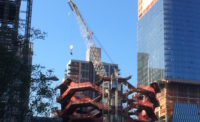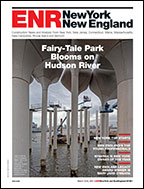Sept. 5, 2011, was not a happy Labor Day celebration for the New York City area's building-trades unions, especially with the upcoming anniversary of the 9/11 attacks bringing back memories of union members' self-sacrificing rescue-and-recovery work. In the months leading up to the holiday, building-trades employers were busy bringing unions to reluctant agreement on the new post-recession realities. Unions for electricians, paint-
ers and crane operators have come to terms on work-rule changes and limits on overtime that cut costs to employers by about 20%. New contracts with other unions still remain unsettled.
At different times, the news media have mentioned that a breakdown in the negotiations could lead to a strike that delays or threatens to bring work at Ground Zero to a halt. This kind of statement may suggest that the bellicose building trades were holding hostage our proper respect to those who died on 9/11. No matter who floated this idea or whether it was true, the idea seemed designed to add leverage against the unions by arousing public concern about “overpaid” construction workers.
That's a tough sell. It is easy enough for contractor-employers to target the featherbedded or high-six-figure jobs. But rather than portraying all union building-trades crafts-people as pampered royalty, these workers should be seen as realistic businessmen and women. Without open-shop contractors nipping at their market share, union carpenter journeymen and journeywomen working in a high-cost-of-living metropolitan area could command a wage and benefit package as high as $75 to $80 dollar an hour.
But, in 2011, New York City is no longer a competitive vacuum, and union contractors can't compete on the old terms against nonunion employers. The big contractors and CMs already are using both union and open-shop subs, with both routinely going through the same gate on many jobs.
Other than in elections, union power pretty much comes down to the threat of a strike. But in a world of waning union membership and market share, even talking about a strike tends to tarnish both unions and their employers.
Over the years, union business agents and managers have done a lot of threatening, and a few of them were less than honorable. But to say that that's all unions are or do, is to condemn the schoolyard bully by taking away lunch from the entire student body. Imagine that you were an electrician or an abatement worker renovating the guts of Madison Square Garden. Or imagine that you were in the hole, far below the streets of Manhattan, with the sandhogs blasting a new subway line or on the high steel at Ground Zero with the ironworkers. Pampered? The new World Trade Center is the product of proud construction crafts, but it unintentionally signals their declining bargaining power.





Post a comment to this article
Report Abusive Comment